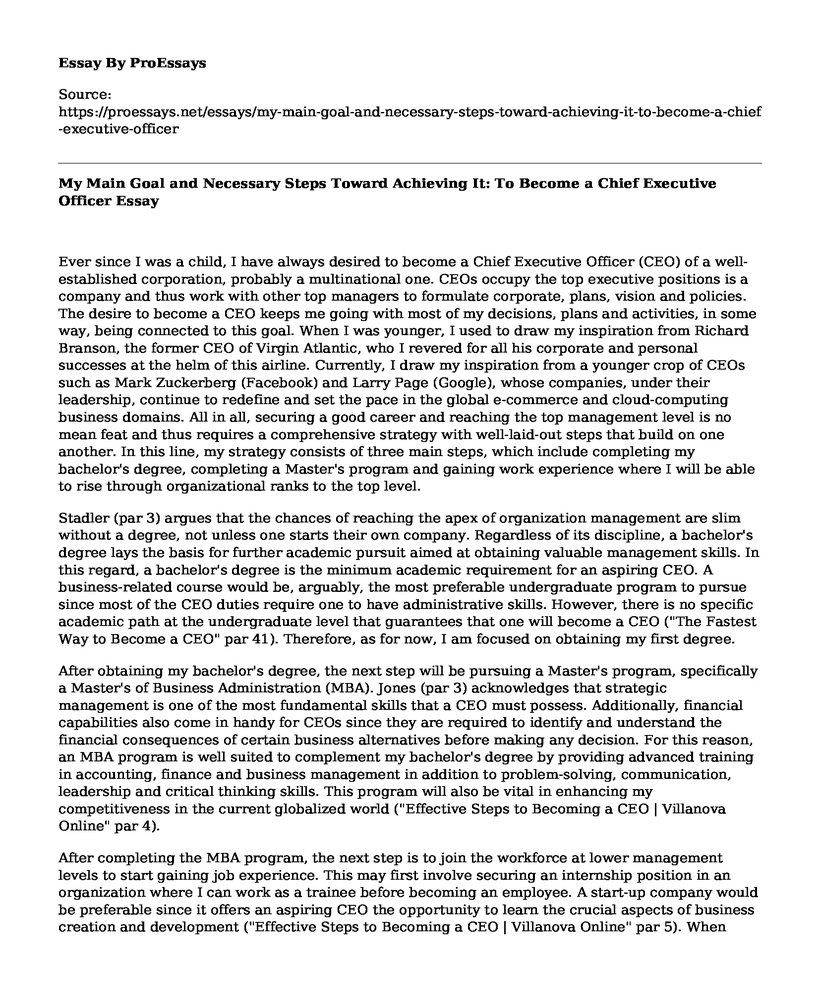Ever since I was a child, I have always desired to become a Chief Executive Officer (CEO) of a well-established corporation, probably a multinational one. CEOs occupy the top executive positions is a company and thus work with other top managers to formulate corporate, plans, vision and policies. The desire to become a CEO keeps me going with most of my decisions, plans and activities, in some way, being connected to this goal. When I was younger, I used to draw my inspiration from Richard Branson, the former CEO of Virgin Atlantic, who I revered for all his corporate and personal successes at the helm of this airline. Currently, I draw my inspiration from a younger crop of CEOs such as Mark Zuckerberg (Facebook) and Larry Page (Google), whose companies, under their leadership, continue to redefine and set the pace in the global e-commerce and cloud-computing business domains. All in all, securing a good career and reaching the top management level is no mean feat and thus requires a comprehensive strategy with well-laid-out steps that build on one another. In this line, my strategy consists of three main steps, which include completing my bachelor's degree, completing a Master's program and gaining work experience where I will be able to rise through organizational ranks to the top level.
Stadler (par 3) argues that the chances of reaching the apex of organization management are slim without a degree, not unless one starts their own company. Regardless of its discipline, a bachelor's degree lays the basis for further academic pursuit aimed at obtaining valuable management skills. In this regard, a bachelor's degree is the minimum academic requirement for an aspiring CEO. A business-related course would be, arguably, the most preferable undergraduate program to pursue since most of the CEO duties require one to have administrative skills. However, there is no specific academic path at the undergraduate level that guarantees that one will become a CEO ("The Fastest Way to Become a CEO" par 41). Therefore, as for now, I am focused on obtaining my first degree.
After obtaining my bachelor's degree, the next step will be pursuing a Master's program, specifically a Master's of Business Administration (MBA). Jones (par 3) acknowledges that strategic management is one of the most fundamental skills that a CEO must possess. Additionally, financial capabilities also come in handy for CEOs since they are required to identify and understand the financial consequences of certain business alternatives before making any decision. For this reason, an MBA program is well suited to complement my bachelor's degree by providing advanced training in accounting, finance and business management in addition to problem-solving, communication, leadership and critical thinking skills. This program will also be vital in enhancing my competitiveness in the current globalized world ("Effective Steps to Becoming a CEO | Villanova Online" par 4).
After completing the MBA program, the next step is to join the workforce at lower management levels to start gaining job experience. This may first involve securing an internship position in an organization where I can work as a trainee before becoming an employee. A start-up company would be preferable since it offers an aspiring CEO the opportunity to learn the crucial aspects of business creation and development ("Effective Steps to Becoming a CEO | Villanova Online" par 5). When working at a lower organizational level, one gains experience in profit and loss responsibility, functional flexibility and a global role. Besides, most companies adopt a philosophy of "promote from within", therefore, being more reason as to why I need corporate experience before becoming a CEO (Pasmore 11).
Conclusion
While working, I will be able to improve my personal readiness for the topmost organizational position. This is because work experience helps in cultivating values and beliefs of a good leader as well as building individual qualities such as assertiveness, native intelligence, communication, strategic thinking, boldness, self-regulation and boldness (Pasmore 12). Finally, the connections that I will establish during this time through networks with my workmates and supervisors will be key in reinforcing my access and influence once I become promoted to the CEO position.
Works Cited
"Effective Steps To Becoming A CEO | Villanova Online". Taxandbusinessonline.Villanova.Edu, 2018, https://taxandbusinessonline.villanova.edu/resources-business/article-business/effective-steps-to-becoming-a-ceo.html. Accessed 12 Dec 2018.
Jones, David. "What Skills Does A CEO Need In 2018?" The CEO Magazine, 2018, https://www.theceomagazine.com/business/management-leadership/what-skills-does-a-ceo-need-in-2018/. Accessed 12 Dec 2018.
Pasmore, William. "Are You Ready? 4 Keys To Becoming A CEO". Ccl.Org, 2014, https://www.ccl.org/wp-content/uploads/2015/04/AreYouReady.pdf. Accessed 12 Dec 2018.
Stadler, Christian. "How To Become A CEO: These Are The Steps You Should Take". Forbes.Com, 2015, https://www.forbes.com/sites/christianstadler/2015/03/12/how-to-become-a-ceo-these-are-the-steps-you-should-take/#183b3b281217. Accessed 12 Dec 2018.
"The Fastest Way to Become A CEO". Crimson Education, 2017, https://www.crimsoneducation.org/za/blog/become-a-ceo. Accessed 12 Dec 2018.
Cite this page
My Main Goal and Necessary Steps Toward Achieving It: To Become a Chief Executive Officer. (2022, Nov 06). Retrieved from https://proessays.net/essays/my-main-goal-and-necessary-steps-toward-achieving-it-to-become-a-chief-executive-officer
If you are the original author of this essay and no longer wish to have it published on the ProEssays website, please click below to request its removal:
- Essay Sample on Managing Sustainability at San Jose State
- Flight Attendant Position Application Letter
- Maslow's Pyramid Theory and Leadership Essay
- Critical Knowledge, Skills, and Abilities for an IT Developer Paper Example
- Crisis Plan For McDonald's - Research Paper
- Financial Crisis of a Community Health Center - Paper Example
- Essay Example on A Student Outing Day: Unexpected Conflict Looms







